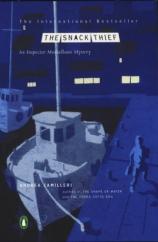Reading Group Guide
Discussion Questions
The Snack Thief: The Inspector Montalbano Series #3

1. The Snack Thief is the first Montalbano mystery to place the inspector in a context of family relationships. Montalbano both deals with the terminal illness of his own father and takes determined steps toward becoming both a husband and an adoptive father. In general, he is not as comfortable with familial relationships as he is in his professional work. Why not?
2. One of the most important figures in The Snack Thief, the mother of François, never appears directly in the story. How does Camilleri attempt to make her a convincing and even sympathetic character, even though we never actually meet her? Does he succeed?
3. Montalbano is deeply suspicious of his second-in-command, Mimì Augello, on both a personal and a professional level, yet Augello may also be viewed as a compassionate man and an earnest, if sometimes imprudent, subordinate. Does Augello deserve suspicion, or is Montalbano irrational in his appraisal of him?
4. When Montalbano discovers he is about to be promoted, his reaction is emphatic: he fights tooth and nail not to have the promotion go through. Why do you think Montalbano is so averse to what would seem to be a step forward in his career?
5. Montalbano is openly disgusted with Lapècora's son, who callously ignores his father's desperate plea for help. Later in the novel, however, Montalbano cannot bring himself to visit his own dying father. How might this seeming contradiction in attitudes be explained?
6. Little François provides Montalbano with an important inspiration when he tries to cut up the pieces of a puzzle so that he can try to reassemble the puzzle's picture in the way he likes. How is François's reshaping of his puzzle an apt metaphor for Montalbano's approach to sleuthing?
7. The plot of The Snack Thief involves the operations of Islamic terrorists, yet the portrayals of some of the Muslim characters who are not involved in terrorism are very favorable. How does Montalbano's treatment of the Islamic element in the culture of Sicily differ from the approach to Islam that one might expect from an American writer of crime fiction?
8. Camilleri depicts the antiterrorist authorities, as represented by Colonel Lohengrin Pera, as being almost as indifferent to human suffering as the terrorists themselves. Were you comfortable with this characterization? What obligation, if any, do counterterrorist forces have not to descend to the moral level of their enemies? Do the "reasons of state," such as Pera describes them, justify acts like the "neutralization" of Karima?
9. In The Snack Thief, after dodging the issue for the better part of three novels, Montalbano finally proposes marriage to Livia. However, he does so in an unorthodox fashion and for a somewhat unusual reason. If you were Livia, would you accept Montalbano's offer of marriage on the terms in which he couches it? Explain your reasons.
10. Toward the end of the novel, Professor Pintacuda accuses Montalbano of perpetually trying to escape from everyday reality. Is this accusation truthful? If so, is Montalbano justified in his penchant for escapism?
The Snack Thief: The Inspector Montalbano Series #3
- Publication Date: October 28, 2003
- Paperback: 304 pages
- Publisher: Penguin (Non-Classics)
- ISBN-10: 0142003492
- ISBN-13: 9780142003497







